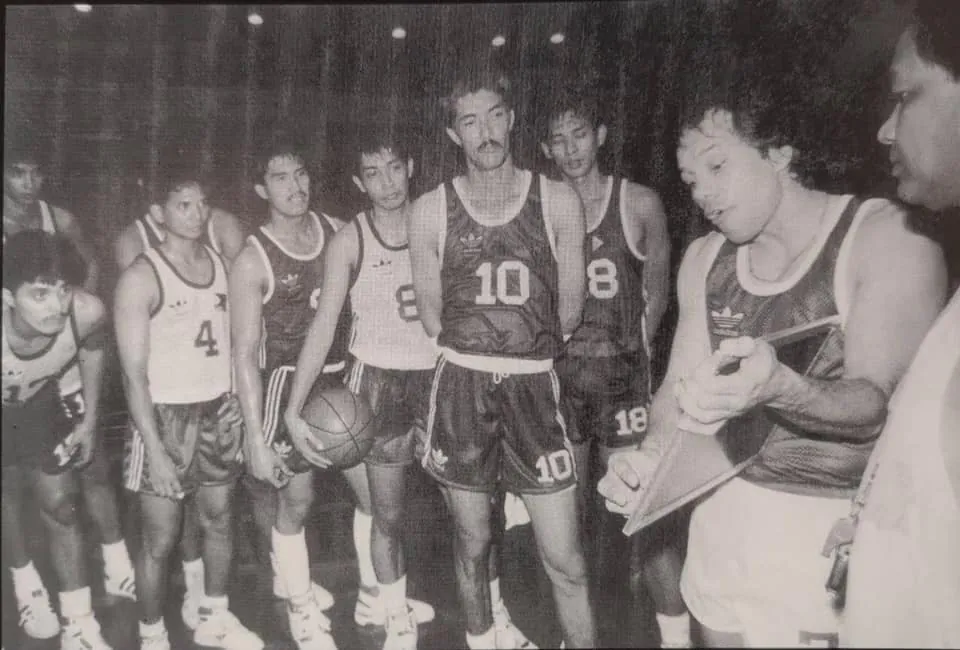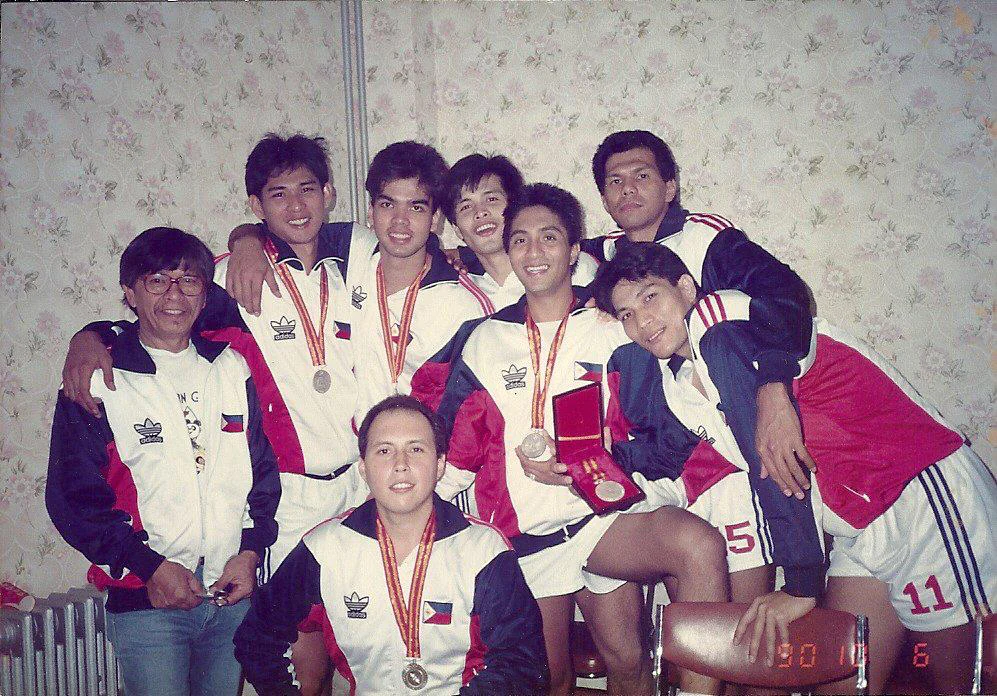Exactly 32 years ago today, on October 6, 1990, the first national team featuring PBA players went up against the Chinese national team in their Beijing hometown for the basketball gold medal in the Asian Games. It was the culmination of a frenzied, albeit short, preparation of Coach Sonny Jaworski’s charges in its goal of regaining the gold medal in the Asian Games last won in 1962.
In its first Throwback Thursday feature, The Rivalry treks back to 1990 and recounts the glorious events leading to that gold medal game against host China.
Open basketball
Sometime April of 1989, FIBA, in a special session and through the leadership of Borislav Stankovic, voted 56-13 in a landmark decision allowing professional players to suit up for their national teams. This was to address the heavily-criticized rule barring professional players from not playing in FIBA tournaments when players like Brazil’s Oskar Schmidt, were earning almost half a million dollars annually in Italy and still allowed to represent countries. Stankovic was quoted to have said, “we see this as a triumphant entry into the 21st century.”
Once the rule was changed, it wasn’t only the NBA players that benefited. Almost 13,000 kilometers away in Manila, Filipino basketball fans rejoiced. After 15 years of debacle after debacle in international jousts, except during the time of the NCC national team in 1985-86, the Philippines would finally have its PBA players in the national team and reclaim the title of “best basketball country in Asia.”
The BAP, under President Lito Puyat, immediately made representations with the PBA officials to form a national team in time for the 1989 ABC tournament to be held in Beijing. The PBA declined the invitation, saying that the league schedule was already set, but committed to play in the Asian Games the following year.
PBA’s involvement
In the planning session prior to the 1990 season, PBA Commissioner Rudy Salud reaffirmed the league’s commitment to allow the PBA players to form the national team for the Beijing Games. The schedule was adjusted, opening one month earlier than the usual, and having a one-month respite in between the second and third conferences.
However, the PBA proposed a mixed roster setup made up of eight pros and four amateur players. This proposal was severely criticized by the basketball public, forcing Salud to backtrack and change their position. PBA Chairman Rey Marquez announced that the league “is willing to sit down and thresh out alternatives” in an effort to curb the criticism.
In May 1990, Puyat, alongside Salud and other key PBA officials, announced the appointment of Añejo Rum’s Robert Jaworski as head coach of the national team, SMB’s Norman Black as his assistant, and Purefoods’ Baby Dalupan as consultant. Businessman Go Teng Kok of Goyu & Sons was selected as team manager. Jaworski’s appointment included blanket authority to select the 12 players that would make up the final roster. Dalupan later begged off, citing health reasons. Jaworski’s assistant, Rino Salazar, was brought in to assist the Big J in the bench. More importantly, the PBA also said that they were willing to put up an all-PBA national team.
The PBA was teetering in controversy brought about by the walkout of Añejo 65 in Game 6 of their First Conference finals series against Shell, giving the latter its first PBA title. The timing of the announcement could not have come at a better time, helping the league freshen its image to the public.
In late July, Jaworski announced his choices – Ramon Fernandez, Yves Dignadice, Samboy Lim and Hector Calma of San Miguel Beer, Benjie Paras and Ronnie Magsanoc of Formula Shell, Allan Caidic and Zaldy Realubit of Presto Tivoli, Alvin Patrimonio, Jerry Codiñera and Nelson Asaytono of Purefoods, Chito Loyzaga, Dante Gonzalgo and Rey Cuenco of Añejo Rum, and Bong Alvarez of Alaska. When the final 12 was named, Asaytono, Realubit and Alvarez were relegated to the reserve list. Twice a day practices were held at the Greenmeadows Clubhouse basketball court after at the end of the All Filipino Conference.
Unfortunately, Codiñera went down with hepatitis A a few weeks prior to the Asian Games, forcing Jaworski to replace him with Realubit. Caidic, on the other hand, injured his left hand in Game 6 of their All-Filipino Finals series against Purefoods on September 2. Fortunately, the Triggerman’s hand healed just in time for the Asian Games.

Road to the gold medal game
Expectations were high that the Philippines’ Dream Team would win the gold. Experts predicted that the hosts and Jaworski’s wards would eventually meet in the gold medal match. The international media followed the national team closely in Beijing as they were the first to take advantage of the FIBA open basketball policy.
Bracketed in Group C alongside Japan and Pakistan, the nationals were fortunate to draw the Pakistanis first, winning 129-81, after experiencing opening jitters and a cold start. Paras led the team with 25 points and 16 boards in 24 minutes of action. Their next game was against Japan, regarded as one of the top seeds of the tournament. Down 29-43 at halftime as Japan leaned on the efforts of big man Akifumi Yamasaki, the RP team roared back at the start of the second half, with Caidic leading the charge. Caidic ended up with 34 points as he carried the team to an 86-78 victory.
Fernandez vividly remembered what Jaworski told him prior to the start of the second half. The Franchise revealed in an interview in Episode 50 of “An Eternity of Basketball” , that Jaworski came to him and said, “Mon, gawin mo na lahat ng kaya mong gawin para sa game na ito, you have to do something about this already and make the move.” True enough, the Philippines woke up and came up with an 18-0 blast to overhaul the margin and retake the lead, 47-43.
In the quarterfinals, the Philippines was in Group I with Group A top seed China, Group B runner-up North Korea, and Group D runner-up United Arab Emirates. North Korea was first, and the PBA pros leaned on their vast experience, talent, and the immovable defense of Chito Loyzaga on the 7’8 Ri Myung Hun to upend the Nokors, 98-82. Coach Norman Black admitted in “An Eternity of Basketball” that afterwards he “had a whole new respect on Loyzaga after that game.”
They got to play the rested Chinese the very next day in front of a packed and rowdy crowd at the Capitol Indoor Stadium. China went on a tear from the get go, leading 56-28 at halftime, as the Philippines struggled to put the ball inside the hoop. With the lead ballooning further to more than 40 points by the halfway point of the second half, Jaworski opted to bring in his shock troopers to concede defeat. Assistant Coach Black admitted that Coach Jaworski told him that “we needed to save our legs as we were playing games everyday.”
China hammered out a 125-60 victory. Zhang Yongjun led all scorers with 36 points anchored on eight triples. Wang Fei tallied 24 while Ma Jian came up with an impressive 14-14 statline. Gong Xiaobin and Sun Feng Wu also contributed 13 and 12 respectively. For the Philippines, it was Fernandez who topscored with 16 markers, followed by Paras’ 14 points and 7 boards.
Playing its third game in three days, the Philippines struggled all game long against a game but winless UAE squad. Hamdan Al-Baddal was almost unstoppable, ending the night with 26 points. But Paras continued to dominate inside, ending up with 21 points with Loyzaga chipping in 11 from 3 treys. Caidic felt that the team was “tired and frustrated having come from a loss the previous day, the debilitating loss of 65 points mentally affected the players.”
Meanwhile, in the other quarterfinals bracket, Japan shocked South Korea, 94-91 in a monumental comeback after being down by 17 at the end of the half. The win meant Japan would end up the top team in their Group II bracket, with South Korea relegated to second. This was a significant development for the RP team as they ended up playing against the Japanese instead of the South Koreans in the crossover semifinals.
China took care of business, beating South Korea, 92-88, even after trailing by 7 at the half. Zhang led the way with 23 points, followed by Ma Jian’s 17, Wang Fei’s 14, and Gong’s 12. Kim Hyung-Jun led the attack for the losers with 30 points, followed by the 17 of Kim Yoo Taek, and Hur Jae’s 16 points.
Japan had zeroed in on Caidic by this time and made sure they had a defender at his tail at all times. On the other hand, Jaworski focused his defense on Yamasaki, limiting his previous 34-point production by more than half.
At the half, Japan had a 50-45 lead. But although they were leading, they were wary for a Philippine uprising. Led by Lim, Paras and Caidic, the Philippines slowly chipped into the lead and went on to win the pulsating game, 94-90.
It was Kuniharu Yatsuda who led Japan with 24 markers. Samboy Lim delivered for the Philippines with his timely incursions and clutch free throw shooting, making 18 points.

Playing for gold
Playing in front of a hostile crowd of more than 15,000 spectators, Jaworski understood that they would need more than luck to upset the favored Chinese. With only two weeks of solid preparation, the Big J hadn’t whipped the team yet to full cohesion, leading to several turnovers per game. For the Philippines to contend, they needed to control the boards and minimize their lapses. China, on the other hand, wanted to break the game wide open as early as the first half, worried that the players’ lack of mental toughness may not hold its own against the grittier Filipinos.
And like the first game, China exploded in the first half as the Philippines couldn’t make its outside shots. Down 53-35 at the half, the Philippines tried to rally in the second half and succeeded to cut the lead down to 8 points. But a couple of crucial errors gave the Chinese enough space to carve out a 90-76 gold medal win. Wang Fei, who Calma overwhelmed when they first squared off at the 1982 Asian Youth tournament, led China with 20 points. Zhang continued to thrive, scoring 16 while Sun added 15. For the Filipinos, it was Lim who carried the offensive brunt with 25 points while the heavily-guarded Caidic settled for 11.
Aftermath
The twin losses to China were heavily criticized by Filipino fans, embarrassed most especially by that 65-point debacle in the quarterfinals. Fans slowly realized that the Philippines were not the best Asian basketball country anymore. Others opted to look at the bright side – playing in China’s homecourt is almost mission impossible, what more with just two weeks of preparation? “Even with just a month or two of preparation, we could’ve undoubtedly done better, done a lot of things differently,” Black said. “We weren’t even able to scout our opponents at all, we should have done that, but that’s also because of the preparation time was quite short.”
The PBA gate attendance significantly dipped in the third conference that year. After some soul-searching, the PBA and the BAP accepted that longer preparation time was needed in order to compete against the more cohesive Chinese. With the PBA’s commitment to the BAP solely for the quadrennial Games, they would have four years to whip up a better national team in its effort to win the gold medal.
Watch the entire 1990 Asian Games episode here:
